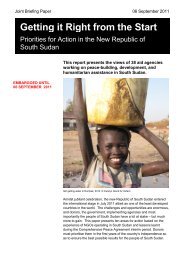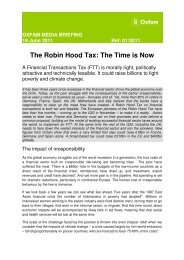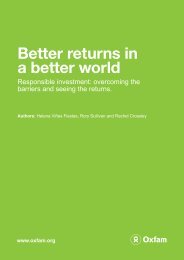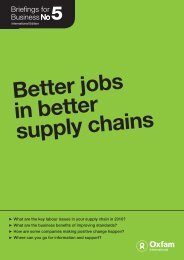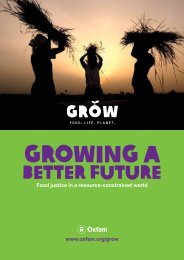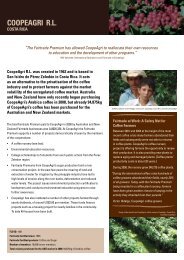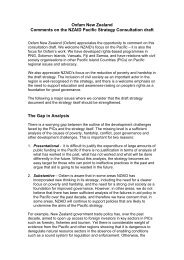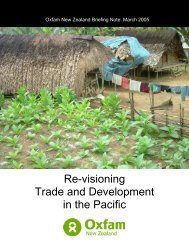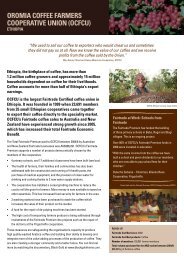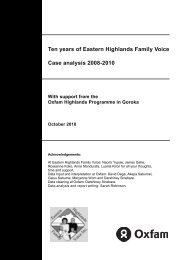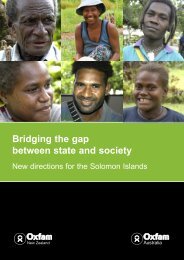Bananas: Unpeeling the Banana Trade - The Fairtrade Foundation
Bananas: Unpeeling the Banana Trade - The Fairtrade Foundation
Bananas: Unpeeling the Banana Trade - The Fairtrade Foundation
Create successful ePaper yourself
Turn your PDF publications into a flip-book with our unique Google optimized e-Paper software.
In response to growing consumer demand for <strong>Fairtrade</strong>and/or organic bananas, countries such as <strong>the</strong> DominicanRepublic and Colombia, which have substantial volumesof both, have grown in importance as suppliers.<strong>The</strong> leading companies importing bananas into <strong>the</strong> UKinclude four multinationals: Chiquita, Dole/JP Fruit, Fyffes,and Del Monte; and three independents: SH Pratt, MackMultiples and Windwards <strong><strong>Banana</strong>s</strong>. <strong>The</strong>se samecompanies also ripen and distribute <strong>the</strong> fruit. Althoughmarket share figures change rapidly with changes in retailsupply chains, <strong>the</strong>y all have a market share of between10% and 20%, except Windwards <strong><strong>Banana</strong>s</strong>(approximately 6%). Toge<strong>the</strong>r <strong>the</strong>se companies controlover 98% of <strong>the</strong> UK market. 61.2 <strong>The</strong> new arrivalsIn 2006, around 81 million tonnes of bananas wereproduced around <strong>the</strong> world, of which 17 million tonneswere exported. 7 Traditional banana exporting countriesare facing fur<strong>the</strong>r challenges in <strong>the</strong> form of major newproducing countries entering <strong>the</strong> market with <strong>the</strong> potentialto reshape <strong>the</strong> world banana economy. <strong>The</strong> world’s twolargest banana-producing countries – India and Brazil –toge<strong>the</strong>r grow almost double <strong>the</strong> volume that is tradedworldwide but currently consume <strong>the</strong> majority of thisdomestically. In India, three state governments – Gujarat,Maharashtra and Kerala – are all actively encouragingfarmers to upgrade <strong>the</strong>ir technology and enter <strong>the</strong> exportmarket. At this stage, <strong>the</strong>re have only been trial shipmentsto Middle Eastern markets, but if <strong>the</strong> Indian initiativesgo ahead, this will have a global impact. Indeed aspokesman for <strong>the</strong> Indian fruit exporter Tata Chemicalsrecently predicted that ‘India, in <strong>the</strong> next five to ten years,will [become <strong>the</strong> world’s] largest grape and bananaexporter so <strong>the</strong>re is big potential in <strong>the</strong> business.’ 8Brazil’s exports to its Sou<strong>the</strong>rn neighbours and toEurope have grown rapidly this millennium, reachingaround 250,000 tonnes a year.In Africa, <strong>the</strong> promise of zero tariff entry to <strong>the</strong> EU becauseof some countries’ Least Developed Country’ status hasattracted fruit company investment. In Ghana, Dolestarted exporting from new plantations in 2006, whileChiquita has tested new varieties in Côte d’Ivoire, withplanting of crops for export now underway. Chiquitatechnicians have also acquired land on <strong>the</strong> coastalplains of Angola, a country which has neverpreviously been involved in banana exports. 9<strong>The</strong> development of new banana companies with acapacity to move into o<strong>the</strong>r markets is also a challengeto <strong>the</strong> dominance of <strong>the</strong> established companies. JFC, <strong>the</strong>biggest of <strong>the</strong> new Russian companies, not only importsEcuadorian bananas for <strong>the</strong> Russian market, but hasinvested in its own plantations, in shipping and in a retailchain, making it <strong>the</strong> world’s first fully ‘vertically integrated’fruit company, with ownership of <strong>the</strong> entire supply chain.1.3 <strong>Fairtrade</strong> in <strong>the</strong> UK marketFollowing several years of hard work to put <strong>Fairtrade</strong>structures in place, <strong>the</strong> Windward Islands shipped <strong>the</strong>first ever <strong>Fairtrade</strong> bananas to <strong>the</strong> UK in 2000. <strong>The</strong> overallmarket has grown from 5,500 tonnes that year to 158,000tonnes in 2007. Driven by <strong>the</strong> commitment of Sainsbury’sand Waitrose to convert to 100% <strong>Fairtrade</strong> bananas, salesare on track to reach 193,000 tonnes for 2008, an overallgrowth of 3,400%. To meet this growing demand, 63producer organisations from eight countries (Ghana,Ecuador, Peru, Colombia, Windward Islands, Costa Rica,Jamaica and <strong>the</strong> Dominican Republic) have now beencertified, with 42 of <strong>the</strong>m supplying <strong>Fairtrade</strong> bananasto <strong>the</strong> UK.350300250200150100500Value(£000)Growth of <strong>the</strong> UK <strong>Fairtrade</strong> banana market (by value)(2000-2007)1999Year200020012002Sources: DEFRA and <strong>Fairtrade</strong> <strong>Foundation</strong>Conventional<strong>Fairtrade</strong><strong>The</strong> initial success of <strong>Fairtrade</strong> bananas owes much todedicated <strong>Fairtrade</strong> companies like <strong>the</strong> Dutch pioneerAgrofair which imported <strong>the</strong> world’s first <strong>Fairtrade</strong> bananasinto Europe in 1996. It is co-owned by <strong>the</strong> farmers whogrow <strong>the</strong> fruit it imports and markets exclusively <strong>Fairtrade</strong>fruit and juices, having now expanded into mangoes,citrus fruits and pineapples.200320042005200620075Communication from Windwards <strong><strong>Banana</strong>s</strong>.6Information compiled by <strong>Banana</strong> Link from trade sources.7United Nations Food and Agriculture Organization.8Freshinfo News. Saturday 10 January 2009.9Communication from <strong>Banana</strong> Link.page 3 <strong>Unpeeling</strong> <strong>the</strong> banana trade



